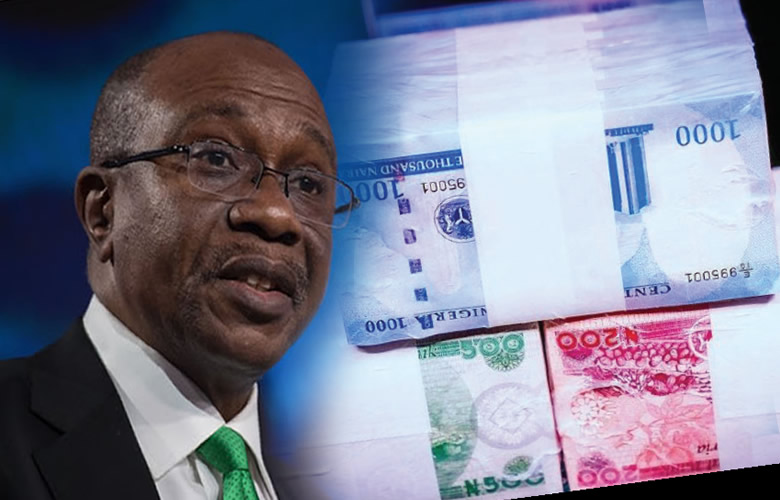The Governor of the Central Bank of Nigeria (CBN), Godwin Emefiele, succumbed to the Supreme Court’s ruling in March that old naira notes should be returned to circulation as legal tender. But the apex bank seems not to have fully grasped the untold difficulties it subjected Nigerians to, from October 2022 to March 2023. Over the period of six months the obnoxious naira redesign policy destabilized the economy, brought about so much frustration that some Nigerians died due to their inability to access their cash, confiscated by the CBN; and many informal businesses, especially in rural communities sank.
Yet, Emefiele failed to take responsibility for the damaging policy; he failed to apologize to the people over the thoughtless misadventure. Neither did he resign for the shameful display of incompetence as CBN governor. The Presidency and the Central Bank of Nigeria abused their powers. Those in these institutions, who misled the country, must not be let to go scot-free. There must be serious consequences for such abuse of power.
In many parts of the world, monetary policies, those as serious as redesigning a currency, are not approached in the casual and impulsive manner the CBN governor handled the naira redesign policy.
The first step, usually, would be a robust consultation among major stakeholders in the economy, who would debate it, investigate, do risk analysis, and forecast its implications and unintended effects on society. If the advantages of embarking on the policy and the risks are not devastating, then the currency is redesigned, and subjected to thorough scrutiny.
The third stage is usually to test the policy, using a pilot study in a part of the country where its roll-out may not damage the system. The outcome of the pilot study is subjected to further scrutiny. Then, if stakeholders are satisfied and the people are educated about the monetary policy, it is rolled out, perhaps, in phases. A typical application of this approach is the digital Euro. The European Union started the investigation into it in October 2021, and says that stage of the monetary policy will be completed in October 2023.
The EU is taking two years to investigate it, to determine if and how it should be rolled out. But in Nigeria, digital naira or e-Naira was rolled out in less than six months.
It is disheartening that the Buhari administration created so much unnecessary pain in the name of redesigning the currency, but when the policy failed, those who rode the country through that unnecessarily difficult terrain failed to resign, apologize, and were not sacked for their poor judgment.
It is common knowledge that no country runs the kind of cashless economy that the government attempted to foist on Nigeria. Even developed and highly literate societies in Europe, America and Asia, where the economies are lubricated with e-transactions, there is hardly any restriction on the people’s access to their cash deposits; not the way Emefiele imposed on Nigerians.
Over the period that the ill-conceived policy was implemented, several institutions failed the Nigerian people. The National Assembly, made up of representatives of the people, did not do enough to halt the naira redesign policy, though it was glaring that it was a disaster waiting to happen. The Nigeria Labour Congress (NLC) also failed to act in line with its philosophy of defending the interests of workers and the poor masses. Labour failed to resist the policy. Even the Supreme Court’s dilly-dally pronouncements and failure to sanction the president and CBN for acting against its initial ruling that the old naira notes were still legal tender, demonstrated that the apex court failed to assert its authority in the interest of the people. Nigerians looked up to the judiciary to protect them from the misadventures of the executive; that protection came too late, after so much damage had been done to the people. Nigerians did not deserve that kind of lackadaisical treatment.
The Supreme Court ruling specifically mentioned that the old naira notes must be in circulation up to and including December 31, 2023. In this regard, we call on the CBN to ensure that every step is taken to make the new naira notes available in the right measure that will not cause another disruption in the economy by December 2023.
Between March and December, is a period of 10 months, which is long enough for the CBN to print new naira notes and withdraw the old ones. We call on the incoming government to take clear and adequate measures to ensure that Nigerians are not exposed to a repeat of the harrowing experience of the last six months. Any policy that would restrict Nigerians’ access to their deposits in banks creates doubt about the health of the financial sector. It is too dangerous to be repeated.

 Join Daily Trust WhatsApp Community For Quick Access To News and Happenings Around You.
Join Daily Trust WhatsApp Community For Quick Access To News and Happenings Around You.


